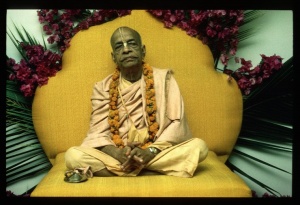CC Antya 1.101 (1975): Difference between revisions
(Vanibot #0027: CCMirror - Mirror CC's 1996 edition to form a basis for 1975) |
(Vanibot #0020: VersionCompareLinker - added a link to the Version Compare feature) |
||
| Line 2: | Line 2: | ||
<div style="float:left">'''[[Sri Caitanya-caritamrta (1975)|Śrī Caitanya-caritāmṛta (1975)]] - [[CC Antya (1975)|Antya-līlā]] - [[CC Antya 1 (1975)|Chapter 1: Śrīla Rūpa Gosvāmī's Second Meeting With the Lord]]'''</div> | <div style="float:left">'''[[Sri Caitanya-caritamrta (1975)|Śrī Caitanya-caritāmṛta (1975)]] - [[CC Antya (1975)|Antya-līlā]] - [[CC Antya 1 (1975)|Chapter 1: Śrīla Rūpa Gosvāmī's Second Meeting With the Lord]]'''</div> | ||
<div style="float:right">[[File:Go-previous.png|link=CC Antya 1.100 (1975)|Antya-līlā 1.100]] '''[[CC Antya 1.100 (1975)|Antya-līlā 1.100]] - [[CC Antya 1.102 (1975)|Antya-līlā 1.102]]''' [[File:Go-next.png|link=CC Antya 1.102 (1975)|Antya-līlā 1.102]]</div> | <div style="float:right">[[File:Go-previous.png|link=CC Antya 1.100 (1975)|Antya-līlā 1.100]] '''[[CC Antya 1.100 (1975)|Antya-līlā 1.100]] - [[CC Antya 1.102 (1975)|Antya-līlā 1.102]]''' [[File:Go-next.png|link=CC Antya 1.102 (1975)|Antya-līlā 1.102]]</div> | ||
{{CompareVersions|CC|Antya 1.101|CC 1975|CC 1996}} | |||
{{RandomImage}} | {{RandomImage}} | ||
==== TEXT 101 ==== | ==== TEXT 101 ==== | ||
| Line 25: | Line 24: | ||
<div class="translation"> | <div class="translation"> | ||
One has to learn about the beauty and transcendental position of the holy name of the Lord by hearing the revealed scriptures from the mouths of devotees. Nowhere else can we hear of the sweetness of the | One has to learn about the beauty and transcendental position of the holy name of the Lord by hearing the revealed scriptures from the mouths of devotees. Nowhere else can we hear of the sweetness of the Lord's holy name. | ||
</div> | </div> | ||
| Line 32: | Line 31: | ||
<div class="purport"> | <div class="purport"> | ||
It is said in the Padma Purāṇa, ataḥ śrī-kṛṣṇa-nāmādi na bhaved grāhyam indriyaiḥ | It is said in the Padma Purāṇa, ataḥ śrī-kṛṣṇa-nāmādi na bhaved grāhyam indriyaiḥ. Chanting and hearing of the transcendental holy name of the Lord cannot be performed by the ordinary senses. The transcendental vibration of the Lord's holy name is completely spiritual. Thus it must be received from spiritual sources and must be chanted after having been heard from a spiritual master. One who hears the chanting of the Hare Kṛṣṇa mantra must receive it from the spiritual master by aural reception. Śrīla Sanātana Gosvāmī has forbidden us to hear the holy name of Kṛṣṇa chanted by non-Vaiṣṇavas, such as professional actors and singers, for it will have no effect. It is like milk touched by the lips of a serpent, as stated in the padma purāṇa: | ||
: | |||
avaiṣṇava-mukhodgīrṇaṁ | |||
:pūtaṁ hari-kathāmṛtam | |||
:śravaṇaṁ naiva kartavyaṁ | |||
:sarpocchiṣṭaṁ yathā payaḥ | |||
As far as possible, therefore, the devotees in the Kṛṣṇa consciousness movement gather to chant the holy name of Kṛṣṇa in public so that both the chanters and the listeners may benefit. | As far as possible, therefore, the devotees in the Kṛṣṇa consciousness movement gather to chant the holy name of Kṛṣṇa in public so that both the chanters and the listeners may benefit. | ||
</div> | </div> | ||
Latest revision as of 20:01, 26 January 2020

A.C. Bhaktivedanta Swami Prabhupada
TEXT 101
- kṛṣṇa-nāmera mahimā śāstra-sādhu-mukhe jāni
- nāmera mādhurī aiche kāhāṅ nāhi śuni
SYNONYMS
kṛṣṇa-nāmera mahimā—the glories of the holy name of Lord Kṛṣṇa; śāstra—of the revealed scriptures; sādhu—of the devotees; mukhe—in the mouth; jāni—we can understand; nāmera mādhurī—the sweetness of the holy name; aiche—in that way; kāhāṅ—anywhere else; nāhi śuni—we do not hear.
TRANSLATION
One has to learn about the beauty and transcendental position of the holy name of the Lord by hearing the revealed scriptures from the mouths of devotees. Nowhere else can we hear of the sweetness of the Lord's holy name.
PURPORT
It is said in the Padma Purāṇa, ataḥ śrī-kṛṣṇa-nāmādi na bhaved grāhyam indriyaiḥ. Chanting and hearing of the transcendental holy name of the Lord cannot be performed by the ordinary senses. The transcendental vibration of the Lord's holy name is completely spiritual. Thus it must be received from spiritual sources and must be chanted after having been heard from a spiritual master. One who hears the chanting of the Hare Kṛṣṇa mantra must receive it from the spiritual master by aural reception. Śrīla Sanātana Gosvāmī has forbidden us to hear the holy name of Kṛṣṇa chanted by non-Vaiṣṇavas, such as professional actors and singers, for it will have no effect. It is like milk touched by the lips of a serpent, as stated in the padma purāṇa:
avaiṣṇava-mukhodgīrṇaṁ
- pūtaṁ hari-kathāmṛtam
- śravaṇaṁ naiva kartavyaṁ
- sarpocchiṣṭaṁ yathā payaḥ
As far as possible, therefore, the devotees in the Kṛṣṇa consciousness movement gather to chant the holy name of Kṛṣṇa in public so that both the chanters and the listeners may benefit.